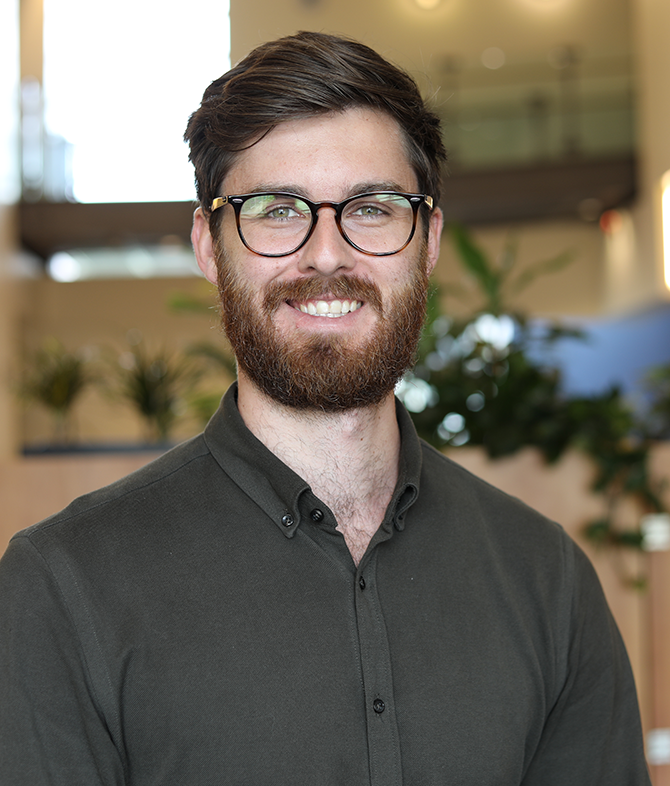Professor John De Backere of the Department of Chemistry is among the 2024-2025 recipients of Cheryl Regehr Early Career Award, announced the U of T Vice President and Provost’s office this April. The award recognizes faculty who demonstrate exceptional commitment to student learning, pedagogical engagement and teaching innovation.
“John has become a recognized leader throughout North America in the area of green inorganic chemistry pedagogy,” said Professor Andy Dicks, Chemistry’s Associate Chair of Undergraduate Studies. “He designed new laboratory curricula for CHM 237H and CHM 338H with the help of Chemistry graduate students through our CTFP program, and an interactive virtual-reality app with the aid of a CHM 499Y undergraduate research student which was profiled in the Journal of Chemical Education last year." 
Dicks made especial note of De Backere’s creative approach in the classroom. "John highly personalizes his lecture slides by incorporating multimedia, pop culture, and humor, significantly boosting engagement and motivation amongst students."
Chemistry’s Outreach Committee chair, Prof. Barb Morra, praised De Backere for his efforts outside the classroom. “John has made incredible contributions as part of several student learning communities. These include co-organizing an annual Chemistry Scholar’s Day that welcomes ~65 high school students into the department and the Chemistry Art Contest.”
Chemistry Stories caught up with Prof. De Backere to ask for his reaction to being selected.
CS: This award is given to faculty members who demonstrate an exceptional commitment to student learning, pedagogical engagement and teaching innovation. Is there a particular area of your recent work that captures the spirit of this description?
JDB: The AR app we developed is a great example of an effort that combines all three aspects of this award…. it’s an innovative approach toward teaching and learning this material, and we see it enhances student engagement with the content. The potential pedagogical benefit is something that we’re also looking to evaluate soon!
The Provost’s announcement says your teaching focuses on enriching students’ laboratory experiences by integrating more authentic and contextualized experiments to engage students in the research process through discovery- and problem-based inquiry. What does that mean?
Traditional "validation-style" or “cookbook” labs are prevalent in many chemistry courses, where every student follows the same “recipe” to make the same product that they validate through characterization methods. While they do have value, they lack the depth and context needed to foster critical thinking, complex data interpretation, collaboration, and research acumen.
I’m interested in developing interesting and nuanced experiments which reflect industry, or more closely mirror authentic research that a chemist performs in the real world. With my colleague Prof. Barb Morra, we developed an interlaboratory experiment that involves collaboration between and within our second year organic (CHM249H) and inorganic (CHM237H) chemistry course labs. Students are responsible for exploring specific aspects of a project, sharing both reagents and data, working collaboratively both as a class and between the two classes to explore a chemical application towards solar cells.

When you think about levelling up our undergraduate classes, what comes to mind?
I'm lucky to be in a department that strongly supports and encourages the evolution of teaching in our discipline through thoughtful curriculum renewal, reform, and innovation. There is so much interest and engagement between my colleagues, both research and teaching stream, with respect to pedagogy and teaching, and many opportunities to collaborate on new initiatives and work with students as partners.
I am perpetually inspired by students and colleagues alike, and this motivates me to continue my own evolution as an educator!
Where would you like to take teaching chemistry in the future?
One aspect of chemistry that truly excites me is how it connects to everything around us, and as chemists we can use our expertise to address important challenges in the world! I aspire to continue integrating this perspective into my teaching and pedagogy, for example through incorporating green chemistry principles or developing more “authentic” and contextualized learning experiences which highlight these aspects.
I want every student, even those entering first year courses not necessarily loving chemistry, to leave with an appreciation (and hopefully love) for the understanding chemistry provides towards the connected world around us and its value in our society.
I’ve been fortunate to collaborate with so many incredible undergraduates, graduates, postdocs and faculty in our department, so this award is a well-deserved recognition and celebration of their incredible hard work and creativity!
One aspect of chemistry that truly excites me is how it connects to everything around us, and as chemists we can use our expertise to address important challenges in the world! --John De Backere
This collaborative approach, combined with innovative teaching methods and an unwavering commitment to student success, make it clear Prof. De Backere will continue to have a strong impact on the future of chemistry education, at U of T and beyond.


